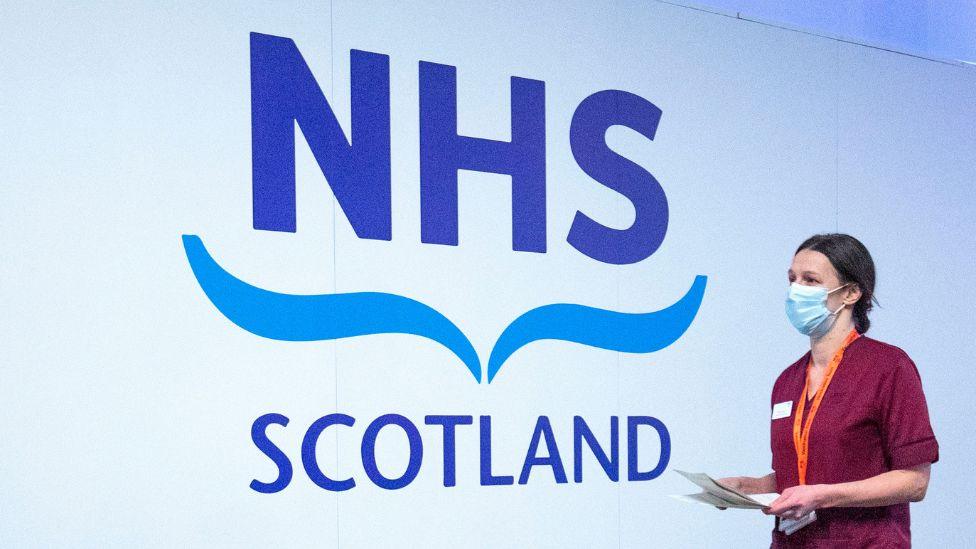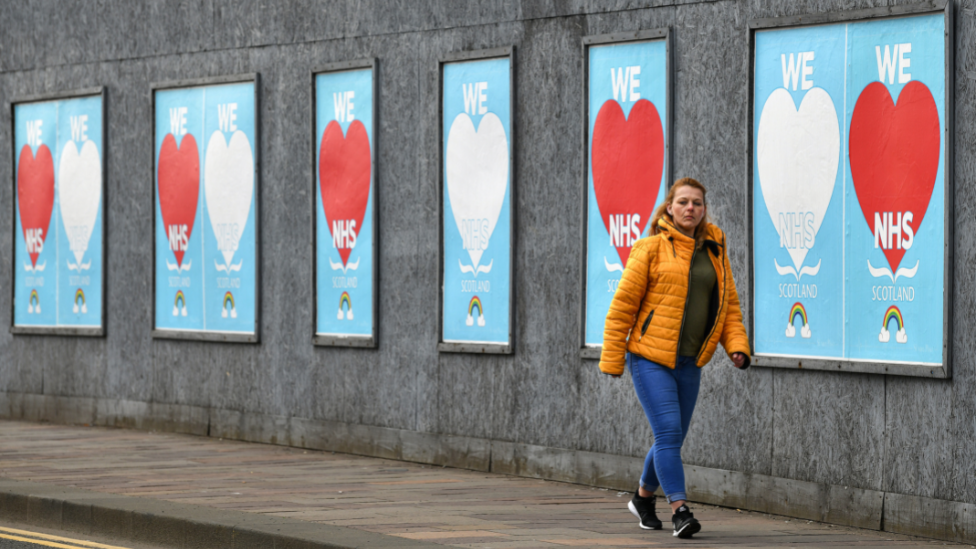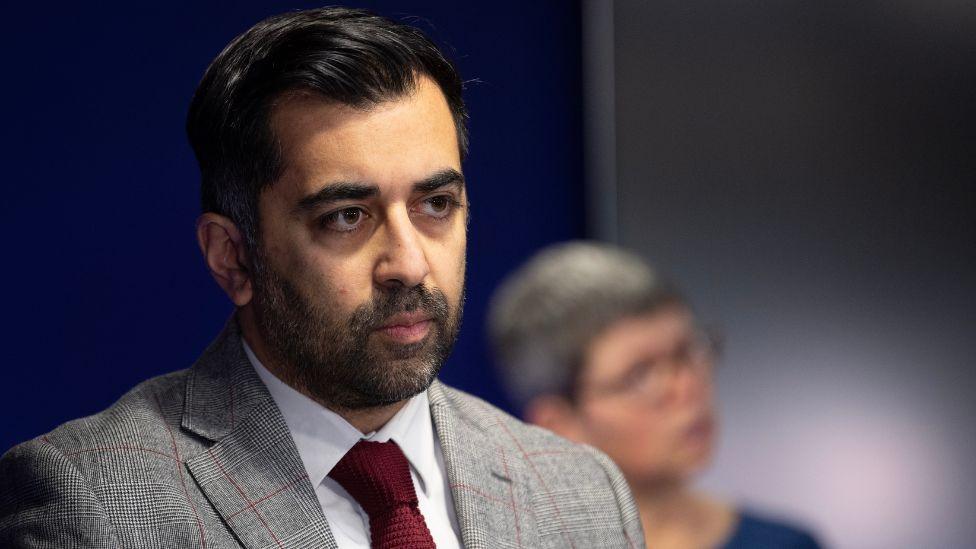How did NHS Scotland end up in a critical condition?
- Published

Audit Scotland's new report has identified major challenges for the National Health Service
Rising demand for private healthcare is a reflection of the NHS in crisis.
Audit Scotland's report on the public service makes for grim reading.
Vast funds are being added to its budget, yet failing to turn it around. The study looks to non-financial changes being required urgently.
As part of your apartment rental, there's not just a gym and rooftop terrace to boost your wellbeing, but access to a virtual GP within little more than half an hour, followed swiftly by delivery of your prescription.
This is not a gated, pampered, prosperous community of seniors in the US sunbelt, but some marketing blurb that reached me today saying that it is coming to a housing development in Edinburgh and several other British cities.
The intention of Moda Living is to create the "happiest and healthiest" of residential communities.
While an offshoot of the Lloyds Pharmacy chain provides your GP service, tenancy also gives you 40% off private counselling, therapy and wellbeing sessions to improve your mental health.
The company has learned some lessons from lockdown about the constraints of living in flats, and it wants to tackle them.
But this approach to private health provision is also learning lessons from what's going on in the NHS, and look increasingly like a sign of what's to come.
The NHS's shortcomings and long waiting lists are driving more people into use of private health, and two-tier provision.
Both self-pay options and health insurance have been on the increase. Figures from a health data consultancy last year pointed to a 39% UK increase in self-payment, without insurance, over the preceding two years of Covid, and an 84% rise in Scotland.
Summoned and berated
One of the best advertisements for private health has just been published by Audit Scotland. It's a grim read.
It doesn't reflect the many people who turn to the NHS in crisis and find its staff do a magnificent job.
Instead, it looks at the data for healthcare. The report features "extreme" and "severe" pressures, of slow progress in recovery from Covid, worsening performance on cancer targets and "financial struggles".
The public spending watchdog has been here before, through Covid and before it, highlighting what it sees as the unsustainable financial and organisational limits to what the NHS can be expected to do as it's currently set up.
It points to health boards that are expected to deliver services well beyond their budget's capacity.
For instance, NHS Ayrshire and Arran says it needs £13m to hit reduced waiting time targets. It is getting £7.8m. NHS Highland says it needs £12.5m, but it has been allocated £8.3m.

Audit Scotland reports that only three out of 14 territorial health boards (other than national boards for specialist services such as training) are on course to break even this financial year, if they reach their savings targets. To put it another way, it would require savings of £621m for all the boards to break even.
One of the reasons why the money is not matching the expectation might be that the service is often running to a political timetable. It is pointed out that the NHS Covid recovery plan was promised within 100 days of the 2021 election.
Achieving that promise meant that health boards were not consulted, says Audit Scotland. Yet they are the ones expected to deliver.
Targets are set from on high. Health boards are summoned and berated for failing to meet them. I have long wondered why anyone is willing to serve on them.
The NHS in Scotland plus the social care system are next year getting more than £19 billion, which is what they were on course to receive in 2026-27.
It means other spending gets squeezed. Yet it still fails to turn around the service's problems.
Risk of burn-out
Audit Scotland makes the case that money cannot be the only part of the answer.
It has a strong message for government about what the public is told the NHS can provide, and urges ministers to engage with the public better.
Part of that is through improvements to public health. Reducing demand for health services is an obvious answer to the problem of supplying them.
The supply problem can also be helped if there's a healthier workforce on the job.
Audit Scotland each year reminds the Scottish government that recruitment and retention of staff means ensuring they have better physical and mental health with which to deliver on those expectations.
One of the best ways of helping those who work in the service is to fill workforce vacancies in wards and clinics.
This report cites the evidence of a Royal College of Nursing survey showing 86% of those responding did not believe that patients were safely and effectively provided for on their most recent shift. Some 63% said they felt exhausted and negative over staffing levels and 59% said the issue demoralised them.
A General Medical Council survey of trainees assessed 62% of them to be at moderate to high risk of burn-out. On the average day, more than one in 20 health workers are on sick leave.

The Scottish government recognises that NHS workplaces lack a culture of seeking help. And while more mental health services are being put in place, the watchdog says that more should be done for physical wellbeing, including more space for staff to take breaks.
One consequence is the soaring bill for agency nurses to try to fill some of those gaps. The bill for bank and agency nursing staff has gone up by 93% since 2017, to £321m.
Another is that money is burned on trying to recruit staff from overseas, at an average cost of £12,000 for a nurse and £10,000 for an allied professional such as a physiotherapist.
Even where you can attract them, notes NHS Highland, where are they supposed to live affordably?
Others are concerned about the removal of health professionals from developing countries where they are needed even more.
Nurse attrition
The stand-out message, for several years, has been that workforce planning is woefully inadequate.
The gaps are across the service, but the GP problem is one of the most obvious.
Many have quit or gone part-time. If you account for those working part-time, the number of "whole time equivalent" GPs is down by 26% on 2017.
The innovative answer is to recruit more people to work in support of GPs, and since 2017, Audit Scotland says that progress is being made. But it's still looking for evidence that 3220 more staff in such roles are actually making the difference they should.
It says the target of 800 new GP recruits is unlikely to be reached. Health Secretary Humza Yousaf claimed on BBC Radio Scotland that he's got 250 so far. That's odd, because Audit Scotland can find only 113.

Health Secretary Humza Yousaf is aiming to recruit more GPs to NHS Scotland
Part of this is through training more people into health service roles. There are more funded places being made available in medical schools and nursing courses, but Audit Scotland reports concerns about take-up and attrition, as well as a lack of experienced GPs to supervise trainees.
Two years ago, Audit Scotland recommended that the Scottish government and NHS Scotland improve the quality and extent of data on workforce planning.
It concludes in this year's report: "We have seen little evidence of progress with this".
Predictably, the watchdog report became the ammunition for opposition attacks on the Scottish government and Mr Yousaf in particular. The ministerial response is often deployment of "whataboutery", as in "what about the situation in other parts of the UK?"
That's a fair question, but the comparison sets a low bar. Having long emphasised the efficiency of keeping capacity close to demand, the shock of Covid has left the NHS struggling to recover.
Far more sinister
On the same day Audit Scotland was delivering a harsh verdict on NHS Scotland, the Institute for Government was reflecting on a similar set of issues for England.
Its performance tracker, as a scene-setter for the Westminster budget on 15 March, says healthcare has been affected by "political instability and administrative paralysis caused by the defenestration of two prime ministers over the summer and autumn".
The independently-minded think tank, staffed by some who have served inside Whitehall, went on: "Winter pressures have combined with long-standing problems in adult social care, hospitals and primary care and resulted in the worst NHS crisis in a generation."
The institute add that the UK government's strategy on tackling public sector strikes, where it has one, has not helped, and probably further antagonised the frontline workers required to turn around public services.
It says that has also served to undermine the truce on public sector pay that was won through pay review bodies, and that affects Scotland as well.
Under these pressures, doctors are finding that the extraordinary measures and compromises required of them during the pandemic have not been rolled back.
Gavin Francis is an Edinburgh GP and author who recently wrote in the magazine 1843, with a reflection on advice he received last November from the General Medical Council: "A sensible, supportive and necessary intervention in 2020, intended to reassure a workforce facing a frightening pandemic, had, by 2022, become something far more sinister - an acceptance of a new status quo, and a chilling normalisation of crisis."